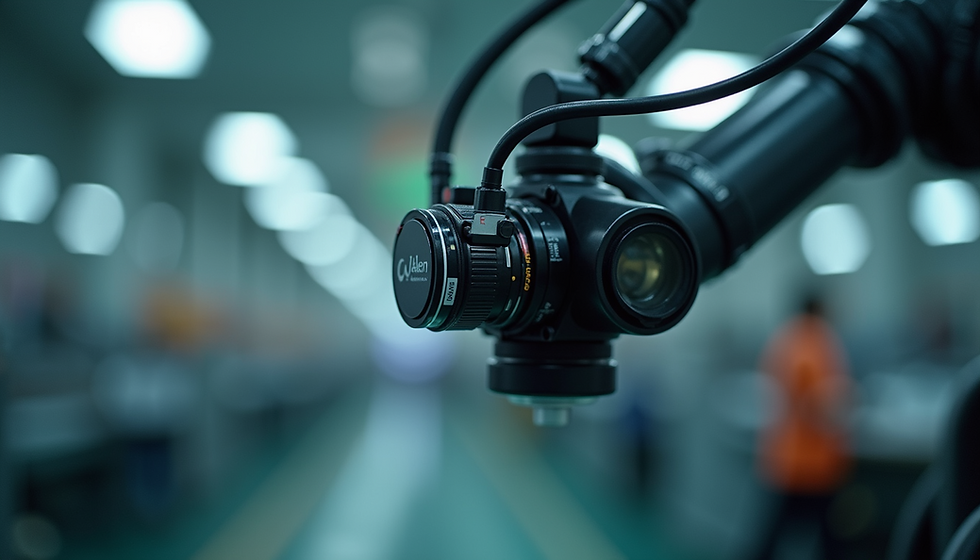Revolutionizing Industrial Sensors with Magnetech Solutions
- Renee Lorenzen
- Nov 18, 2025
- 4 min read
Industrial automation, robotics, and manufacturing demand precise, reliable sensor technology. Magnetic sensing plays a critical role in these sectors by enabling accurate detection, positioning, and safety monitoring. Advanced magnetic sensing technologies have transformed how industries approach these challenges. This post explores how these innovations improve industrial sensors and highlights the role of Magnetech Solutions in driving this transformation.
The Role of Advanced Magnetic Sensing in Industrial Applications
Magnetic sensors detect changes in magnetic fields to provide data on position, speed, and proximity. Advanced magnetic sensing enhances these capabilities by increasing sensitivity, accuracy, and durability. This technology supports harsh industrial environments where traditional sensors may fail due to dust, moisture, or mechanical wear.
Industries benefit from:
Non-contact sensing: Reduces wear and maintenance.
No moving parts: No physical switches or other components to wear out.
High precision: Enables exact positioning, presence, and speed measurement.
Robustness: Operates reliably in extreme temperatures and environmental conditions.
Compact design: Fits into tight spaces on automated machinery.
For example, in robotics, magnetic sensors track joint positions without physical contact, improving reliability and reducing downtime. In manufacturing lines, they monitor conveyor speeds and detect metal parts with high accuracy.

Magnetic sensors integrated into industrial machinery for precise detection.
Key Technologies Driving Magnetic Sensor Innovation
Several technologies underpin the advancements in magnetic sensing:
Hall Effect Sensors
These sensors measure voltage changes caused by magnetic fields. Modern Hall sensors offer improved sensitivity and temperature stability, making them suitable for dynamic industrial environments.
Magnetoresistive Sensors
These sensors detect changes in electrical resistance due to magnetic fields. They provide higher resolution and can detect very small magnetic variations, ideal for precision applications.
Fluxgate Sensors
Fluxgate sensors measure the vector components of magnetic fields. They are used in applications requiring directional magnetic field data, such as navigation and orientation in robotics.
Giant Magnetoresistance (GMR) Sensors
GMR sensors exploit quantum mechanical effects to detect magnetic fields with exceptional sensitivity. They are increasingly used in industrial automation for fine position sensing.
Each technology offers unique advantages. Selecting the right sensor depends on the specific industrial application, environmental conditions, and required precision.
Custom Solutions for Complex Industrial Challenges
Industrial environments often present unique challenges that standard sensors cannot address. Custom magnetic sensing solutions provide tailored responses to these challenges. These solutions include:
Specialized sensor designs for unusual shapes or limited space.
Enhanced environmental protection against chemicals, dust, and moisture.
Integration with existing control systems for seamless operation.
Calibration and tuning to meet exact performance specifications.
For instance, a manufacturing plant may require sensors that detect metal parts moving at high speed on a conveyor belt while resisting interference from nearby machinery. Custom sensors can be engineered to filter out noise and maintain accuracy under these conditions.

Custom magnetic sensor assembly designed for specific industrial manufacturing needs.
Practical Applications and Benefits in Automation and Robotics
Advanced magnetic sensing enhances automation and robotics by providing reliable data for control systems. Key applications include:
Position and speed feedback: Magnetic encoders deliver precise rotational and linear position data for motors and actuators.
Safety systems: Magnetic sensors detect door positions, emergency stops, and guard status to ensure operator safety.
Object detection and tracking: Sensors identify the presence and movement of parts on assembly lines.
Condition monitoring: Magnetic sensors track wear and tear on moving components by monitoring changes in magnetic signatures.
The benefits of these applications are tangible:
Reduced downtime due to fewer sensor failures.
Improved product quality through precise control.
Enhanced safety with reliable monitoring.
Lower maintenance costs from non-contact sensing.
Implementing advanced magnetic sensing solutions leads to more efficient and safer industrial operations.
Future Trends in Magnetic Sensing for Industry
The future of magnetic sensing in industrial applications includes several promising trends:
Miniaturization: Smaller sensors enable integration into compact devices and complex machinery.
Wireless connectivity: Sensors with wireless capabilities facilitate remote monitoring and data collection.
Artificial intelligence integration: Combining sensor data with AI improves predictive maintenance and process optimization.
Energy harvesting: Self-powered sensors reduce wiring complexity and energy consumption.
Preventative maintenance and smart design integration: Anticipate and address failures, weak parts, and wear before a fault causes downtime and disruptions.
These trends will further enhance the capabilities and applications of magnetic sensors in industrial settings.
Partnering with Experts for Magnetic Sensing Solutions
Choosing the right partner for magnetic sensing solutions is critical. Companies like Magnetech specialize in custom engineering and manufacturing of magnetic sensors tailored to industrial needs. Their expertise helps solve complex detection, safety, and tracking challenges worldwide.
By collaborating with such experts, industrial companies gain access to:
Advanced sensor technologies.
Customized designs.
Comprehensive support from concept to production.
Solutions optimized for specific industrial environments.
This partnership approach ensures that sensor systems deliver maximum performance and reliability.
Advanced magnetic sensing is transforming industrial sensors by providing precise, durable, and adaptable solutions. These technologies improve automation, robotics, and manufacturing processes, driving efficiency and safety. Embracing custom magnetic sensing solutions positions industrial companies to meet current and future challenges effectively.



